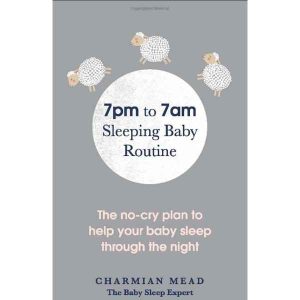“How can I get my baby to sleep through the night?” – It’s the age-old, million-dollar question. With a newborn’s circadian rhythm yet to develop, and their need to feed often, at first things will be a bit unpredictable – but you can introduce a gentle, sleep-friendly routine straight away that will optimise their ability to sleep through when the time comes. We spoke with Charmian Mead, an infant sleep consultant and author of ‘7pm To 7am Sleeping Baby Routine‘, to find out more about sleep associations and behaviour.
What does your sleep consultancy involve and how did you get started?
 My approach is holistic and focuses on digestion, lactation, feeding and sleep associations, behaviour and routine. The resulting effect is solid sleep. I’ve always had a strong maternal instinct and am very passionate about my work and my method. It is also hugely rewarding supporting new parents and making a difference in the first stages of life.
My approach is holistic and focuses on digestion, lactation, feeding and sleep associations, behaviour and routine. The resulting effect is solid sleep. I’ve always had a strong maternal instinct and am very passionate about my work and my method. It is also hugely rewarding supporting new parents and making a difference in the first stages of life.
I’ve worked in childcare for nearly 30 years and specialised in newborn routine in the mid 90s in Australia where my routine was initially developed for twins. Sleeping through the night naturally became a knock-on effect of developing a routine which supported breastfeeding and digestion.
What is gentle sleep training?
I prefer not to use the term “sleep training” as babies on my routine sleep progressively through at their own pace. A gentle routine to encourage sleep works, but it’s important to teach positive sleep associations from the get-go and gradually build a routine in line with a babies gut development and abilities. ‘Encourage, not push’ is my motto! Any sleep training that focuses solely on sleep or nights will rarely work, as a peaceful night’s sleep is a direct result of your baby’s daytime routine.
Why don’t newborns sleep?
They do! If you meet your baby’s needs by way of feeding and digestion and include structured awake time in your routine, a newborn will need to be woken for feeds by day and sleep solidly between short night feeds until it phases out.
What is awake time?
 In my book I reference awake time as a part of the routine which is structured time to encourage your baby to be awake and have stimulated play. As adults we are awake by day and asleep at night. Babies gradually wake up to the world and, weekly and monthly, the length of their awake time increases.
In my book I reference awake time as a part of the routine which is structured time to encourage your baby to be awake and have stimulated play. As adults we are awake by day and asleep at night. Babies gradually wake up to the world and, weekly and monthly, the length of their awake time increases.
Structuring this time after a feed when a newborn is at their most content and increasing this time gradually week by week and then month by month in the first year helps your baby to sleep solidly for naps and overnight.
How important is routine, and is there a general schedule to follow?
For long term and solid stretches of sleep I believe routine is really important. It’s not the only way of course! Sleep positions can be as important as daily routine for settling. In terms of a schedule, the pattern of feeding, play ,sleep, repeat works well with both their digestion and sleep.
When it comes to optimising a baby’s sleeping pattern, is there anything parents can do before their baby arrives?
Yes, you can encourage awake time by day to help stir your baby whilst they are still cooking inside. You may think that lots of movement, activity and maybe music will help stimulate awake time, but actually this could be keeping your baby asleep, like a white noise effect. Instead, have some quiet time to help rouse baby in the daytime.
When is the best time to begin implementing some form of sleep training?
 I refer to sleep training when it’s applied to much older babies or children who have already developed associations and issues with settling and sleep during the newborn stage, or the “establishing stage”. Moving on from this stage to the baby stage and then the toddler stage, your child has carried these associations and sleep habits with them.
I refer to sleep training when it’s applied to much older babies or children who have already developed associations and issues with settling and sleep during the newborn stage, or the “establishing stage”. Moving on from this stage to the baby stage and then the toddler stage, your child has carried these associations and sleep habits with them.
In terms of implementing a sleep-friendly routine, teaching the difference between night and day can be done from week one, starting with setting a clear approach to feeding.
What are some of the common reasons why a baby will have unsettled sleep?
Gas is a big one, most parents under estimate how much burping a newborn needs. A build up of gas can give a false sense of fullness and affect the quantity of milk per feed and their ability to stay awake, which results in poor sleep.
How can you plan for sleep regressions and what’s your advice for coping with them?
It seems that parents consider sleep regression to be inevitable. Sleep regression happens when a baby’s routine doesn’t fit with their development stage. Obvious times are the transition period from newborn to baby and from baby to toddler. If your routine progresses with the baby’s development, especially with adjusting naps and milk to food intake, you may never come up against sleep regression.
Can breastfed babies sleep through the night too?
Yes 99% of the mums I work with breastfeed. My approach is that ‘fed is best’ but it supports and encourages breastfeeding foremost. To achieve a full night sleep when breastfeeding, it’s important to understand your personal milk supply and speed of flow.
What services do you offer?
I offer a variety of parenting packages from weekly maternity bookings to phone appointments, depending on the level of support required and whether you book in advance or on a troubleshooting basis.
If you and your little one are experiencing sleep issues, please check with your paediatrician before introducing a new schedule.



